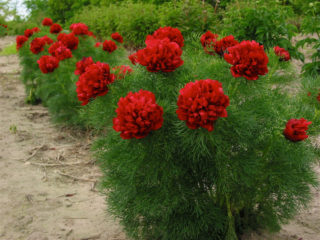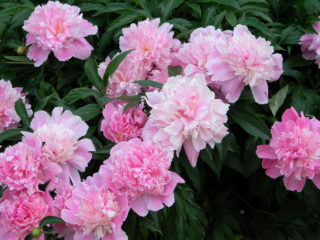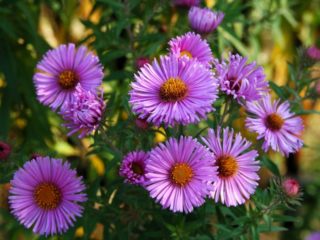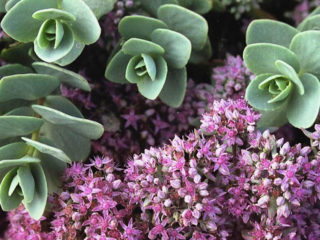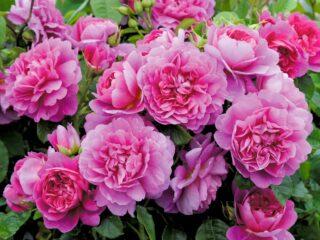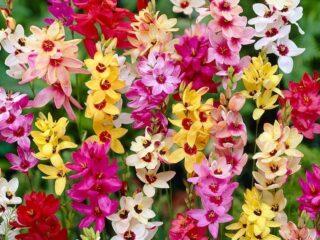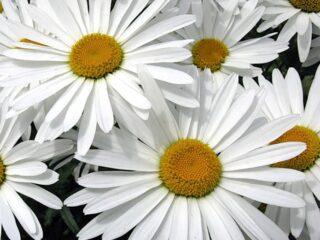Content
Rose Decor Harlequin is one of the varieties of scrubs, that is, it forms a tall flowering bush that resembles a huge bouquet. The variety is valued not only for its unpretentiousness and endurance, but also for its unique color, which changes as the buds open. Such a rose cannot go unnoticed in the garden. However, in order for it to maintain its high vital potential for many years and delight with abundant, long-lasting flowering, it is necessary to provide proper care for it.

Rose Decor Harlequin has an accelerated growth rate
History of selection
This variety of ornamental shrub was officially registered in 1986. Its originator is considered to be the French company Meilland, which specializes in breeding new types of roses. The author of the Decor Harlequin variety is breeder Marie-Louise Meilhan.
The basis for it was such species as Zambra and Arthur Bell. As a result of careful selection, a seedling with stable characteristics was selected, which was subsequently presented at the exhibition under the name Decor Harlequin.The variety received it because of its bright, changing flower color, which was able to successfully combine the shades of the parent forms.
Description and characteristics of roses Decor Harlequin
This perennial is a tall shrub, the height of which reaches 2-2.5 m, and the width is about 1.5 m. The plant is distinguished by a dense, lush crown, which consists of numerous upright growing shoots. The branches of the Shrub Decor Harlequin rose are strong and flexible. The shrub branches well and has a high level of foliage. The needles on the shoots are medium-sized, sparse, located along the entire length of the shoots.
The leaves are oval-elongated, up to 5 cm long, with slightly serrated edges. Their surface is smooth and glossy. The shade of the plates is dark green with a marsh tint.

The leaves of the Decor Harlequin rose are complex, consisting of 3-5 separate segments attached to one long petiole
The variety forms buds at the ends of the shoots. They are collected in racemose inflorescences of 2-5 pieces, but they can also be single. The shape of the buds is cupped. Each of them produces from 28 to 32 petals with highly corrugated edges. According to photos and reviews, the bud of the park rose Decor Harlequin initially has a light yellow tint. Subsequently, the edges of the petals gradually acquire a bright crimson color. But at the same time, the middle of the petals remains yellow, only becoming brighter.

The lifespan of a flower is a week
The diameter of the buds of the Decor Harlequin rose reaches 12 cm when fully opened, so the variety belongs to the large-flowering category. The aroma is pleasant, rich, floral.
The rose variety Decor Harlequin is re-blooming. The shrub forms buds throughout the season with short breaks, starting in June and continuing until the onset of autumn frosts. Already in the second year, this scrub shows abundant flowering, but experienced gardeners recommend normalizing the load so that the shrub can grow a powerful root system.
Rose Decor Harlequin is characterized by high frost resistance. According to information from the originator, it is suitable for the sixth climate zone, which means that it winters well at -23.3 °C. However, according to reviews from gardeners, this species easily adapts to any climatic conditions and can withstand temperatures as low as -40 °C when covered.
The flowers of the Decor Harlequin rose are not afraid of rain and remain highly decorative in high humidity. They can be used for cutting.
Advantages and disadvantages
Rose Decor Harlequin has many advantages, which makes it stand out from other scrubs. But the variety also has certain disadvantages that are worth paying attention to when choosing it.

Rose Decor Harlequin, as a rule, forms a strong bush that does not require support
The main advantages of the variety:
- accelerated growth rate;
- frost-resistant;
- original changing color;
- re-blooming;
- good adaptability to low and high temperatures;
- not afraid of rain;
- suitable for cutting;
- high life potential;
- easy to reproduce.
Flaws:
- requires annual drastic pruning;
- reacts poorly to drafts;
- needs regular feeding;
- may suppress the development of neighboring crops.
Recommendations for cultivation
It is recommended to plant the Decor Harlequin rose in the spring before the growing season begins or in the fall 2-3 weeks before the onset of stable frosts. For ornamental shrubs, you need to choose a sunny, well-lit place throughout the day. It is important that it is protected from cold gusts of wind. Therefore, the optimal solution may be to plant a perennial near buildings or a high fence at a distance of 2.5 m, if they will not shade it.
Rose Decor Harlequin prefers loose, nutritious soil with a neutral acidity level. It is recommended to prepare the planting hole two weeks before planting the seedling. It should be 50 cm wide and deep. It is recommended to pour a layer of drainage at the bottom, and fill the remaining 2/3 of the space with a nutrient mixture consisting of turf, sand, humus and leaf soil in a ratio of 2:1:1:1. It is also additionally recommended to add 0.5 liters of wood ash and mix all the soil thoroughly.
When planting in the center of the hole, you need to make a small elevation, place the seedling on it, straighten the roots, and then sprinkle them with earth, carefully fill all the voids and compact the soil at the base of the bush. After this, it is recommended to water the rose generously.

When planting, the root collar of the seedling should be at soil level
Rose Decor Harlequin can easily tolerate short-term drought, but does not respond well to stagnant moisture in the soil. Therefore, it should be watered only when there is no rain for a long time. Moisturize at the root in the evening at the rate of 30-50 liters of water per bush. The recommended frequency of watering for the variety is 1-2 times a week. The day after irrigation, it is recommended to loosen the soil at the base of the bush to provide air access to the roots.
Rose Harlequin Decor responds well to fertilizing, which ensures the full development of the bush. At the beginning of the growing season in the spring, it is necessary to fertilize the perennial with ammonium nitrate or urea at the rate of 30-50 g. During the formation of buds, which usually occurs in early June, it is recommended to feed the variety with chicken manure 1:15 or mullein 1:10. The third time the Decor Harlequin rose needs to be fertilized between waves of flowering. At this time, it is important to use superphosphate 40-60 g and potassium sulphide 25-40 g. The dosage of fertilizer should be increased as the seedling grows.
Every spring, the perennial needs to be pruned, shortening the crown by half. This stimulates the branching of the bush and ensures abundant flowering.

If the rose grows strongly, the Decor Harlequin rose can be cut to 2/3 of the length of the shoots
The variety does not need shelter for the winter. In late autumn, after leaf fall, it is enough to lay a layer of humus up to 10 cm thick at the base of the bush to protect the root system from freezing. There is no need to insulate the shoots. If they freeze, the bush quickly recovers.
Reproduction methods
The variety propagates well from cuttings. To do this, it is recommended to use one-year shoots, which must be divided into parts 15-20 cm long. Each of them should have 2-3 pairs of leaves. It is necessary to cut the cuttings in June so that they can fully take root before the onset of winter. In this case, the lower cut should be oblique to increase the rooting area, and the upper cut should be even.
For planting, you need to prepare a mixture consisting of peat, sand and turf soil, taken in equal quantities.The lower pair of leaves from the cuttings must be completely removed, and the upper plates must be shortened by half. This will reduce the load on them, but maintain the movement of juice in the tissues. Then it is necessary to powder the lower cut of the cuttings with Kornevin and plant them in a moist soil mixture, deepening them down to the first pair of leaves, and compact the soil around them.
To successfully root the cuttings, you need to build a small greenhouse over them. It needs to be ventilated daily for 15-30 minutes, and also water the seedlings as necessary. If all conditions are met, cuttings of the Decor Harlequin rose will take root in 50-60 days. You can transplant seedlings to a permanent place when they are well strengthened and grown, but not earlier than in a year.

The variety can grow in one place for more than 30 years
Diseases and pests
Rose Decor Harlequin is relatively resistant to common crop diseases. In unfavorable years, the shrub may suffer from powdery mildew and black spot, although, according to many gardeners, the variety is classified as problem-free. Therefore, as a preventative measure, it is recommended to spray ornamental shrubs with a 3% solution of Bordeaux mixture in spring and autumn. And also during the season, if signs of damage appear, it is necessary to treat with Skor.
Among the pests, damage to this climbing rose can be caused by spider mites and aphids.

In case of damage, it is recommended to spray the bush with Actellik, Fitoverm or Fufanon
Application in landscape design
Rose Decor Harlequin looks great as a solitaire against a green lawn. It can also be used in group compositions, combined with conifers.It is possible to plant this rose next to other climbing types of crops in white and yellow shades. At the same time, it is important that they do not interfere with each other’s growth, so you need to maintain a distance of 2 m. The variety is also well suited for creating a hedge. In this case, planting seedlings in a row must be done at a distance of 1 m.
Conclusion
Rose Decor Harlequin is one of the spectacular varieties of climbing varieties of culture. Even a novice gardener can cope with its cultivation. But at the same time, it is necessary to remember that the variety requires mandatory pruning, otherwise you will not be able to enjoy its lush flowering.
Reviews of rose Decor Harlequin
